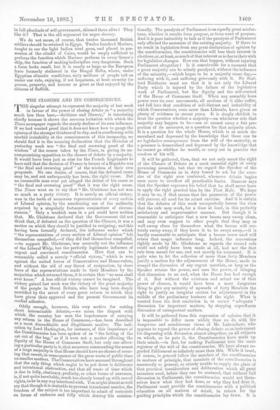TOPICS OF THE DAY.
MR. GLADSTONE'S STATEMENT ON EGYPT.
THE statement made by Mr. Gladstone on Tuesday upon the affairs of Egypt, though simple in form and ap- parently confined to one subject, was in substance most im- portant. The Government have not decided upon a plan for the permanent administration of Egypt, but they have de- cided upon their course during the immediate future. They acknowledge the existence of a state of affairs in Egypt most easily, though not quite accurately, described as an "Inter- regnum," and intend to provide for "order and security" while it lasts, in a very definite way. They cut more knots than the public quite perceives. For a period as yet unde- termined, but described as the period during which Egypt will reorganise her Army and her Administration, the British Government will not officially consult "Europe," and will ignore Turkey, and will garrison Egypt, under a Con- vention concluded with the Khedive alone. No other Power, repeated Mr. Gladstone a second time, will be a party to that Convention ; and Egypt is treated, therefore, for the moment, under the pressure of irresistible circumstances, as an independent State. That is, as any one can see who will think over it, the only road out of the inextricable per- plexities which would otherwise be produced by the Sultan's claims, European claims, French claims, and the claims of the Egyptian Ministry, but to take it must have required both courage and decision. The Convention, which may, Mr. Glad- stone thought, be concluded within a fortnight, but may take longer, will provide, as the similar Convention with France in 1815 did, "for the limited occupation of Egypt, limited as to certain districts, limited in a number of particulars with regard to the cost and management of the force, limited as to the numbers of the occupying force, and also with respect to the charge which is to be imposed on Egypt in respect to that force." This force will assist "in the maintenance of order and security" in Egypt, until after the reorganisation of the Egyptian Army, and will be provided for out of the Egyptian Treasury. Mr. Gladstone postponed the consideration of any charge to be made on the Khedive for the Expedition itself, but was certain that the expenses of occupation should be dis- charged by the country occupied. Whether among these charges the ordinary pay of the garrison which would be pro- vided by the British Exchequer, were the troops recalled, is included, is a detail not mentioned ; but as Mr. Gladstone thought it would be unnecessary to replace the troops in Egypt by an "additional" force at home, we should imagine this part of the burden would not be thrown upon the Egyptian finances.
For a time, therefore, not yet fixed, though intended to be as short as the condition of Egypt will allow, that country is to be occupied and held to order by a regular garrison of 12,000 British soldiers, amenable only to the Government of Great Britain. Turkey may protest, as technically she has an unquestionable right to do, and France may sulk, as, consider- ing her retreat from the Expedition, she has no right to do ; but so far, the ground is thoroughly cleared. England temporarily garrisons Egypt, under a written Treaty with her ruler, who is treated for the moment as independent ; and in garrisoning it, she obtains a provisional right to rule. In legal occupation of the country, and entitled to remain until order is secure, the British Government must of necessity con- trol during the Interregnum the formation of the Army, the main lines of the Khedive's policy—which in the Soudan, for. example, will deeply affect the organisation of his new levies— and all those great reforms which in the aggregate will tend to re-establish " order and security." It does not matter whether they have stated these things or not, or even whether they have intended them or not, they follow, ex necessitate rerun. The Power whose Army is to be paid during the Interregnum must direct the Treasury which is to pay. The Agent con- trolling the garrison which is to maintain order must be consulted as to the methods of ensuring order. Those who order an occupation, to be protracted till they are satisfied its continuance is needless, must be made content as to the arrangements which are to replace theirs. In other and plainer words, Lord Dufferin, or his successor, if we are foolish enough to give him one, must during the Interregnum be virtually the sole counsellor of the Egyptian Ministry ; and must give his counsel with all the authority belonging to the Agent of a Government recognised, by written Convention, as for the moment the Paramount Power.
That is the precise state of affairs under which, as we con- tend, most can be done for Egypt, for British interests in Egypt, and for the world at large, with the least possible inter- ference, and, above all, the least possible visible interference with Egyptian autonomy. During the Interregnum, no one has, or can have, any locus stanch for interference, except Lord Dufferin ; and he can reduce his interference to the absolute minimum required to secure the great objects of his Mission, which are the security for all the world of the great waterway between Europe and Asia, the ascendancy of British influence in the councils of Egyptian Ministers, and the attainment of reasonably decent government for the Egytian population. Lord Dufferin need not worry the Khedive as the Control did. He need not flood the country with hungry Europeans, whose efficiency is neutralised by the displeasure they excite. He need not, except on the questions of slavery and official cor- ruption, interfere with the indigenous civilisation of the Delta, which, once cleared of those two blots, would be no worse than the civilisations which we tolerate or protect in every part of India. He need only recommend in private to the Khedive or the Ministry, and his view will be carried out. Now, what is the objection from the Radical side to making that arrangement—if Europe will consent, for, we repeat, the authority of the European Tribunal should be maintained on all occasions—a permanent one, or at least as permanent as the Protectorate of the Ionian Islands ? The Pall Mall Gazette, so far as we see, advances only two solid reasons against the plan. One is, that France will be very angry. We doubt that very much, if France is courteously treated, if French pecuniary claims are compromised—which was part of our proposal—and if France is distinctly recog- nised as supreme in Tunis, which is merely recognising an accomplished fact, M. Duclerc having a Bill for settling Tunis at this moment, by his own confession, in his pigeon- holes. But it is time the truth should be spoken on this subject, and the truth is that France cannot be listened to beyond a certain point. We value the entente cordials beyond most Liberals, for we know at how many points throughout the world, and more especially in Asia, French interests are identical with our own ; but France cannot be permitted to act in Egypt as if she had assisted in the Expedition. She had a splendid opportunity allowed her, Lord Granville stretch- ing complaisance to a dangerous point; and in refusing it, she surrendered the Control. If she is now mortified by the result of her own act, which, as regards the people of Prance, we do not believe, we deeply regret the mortification of a valu- able friend, and would do anything she demands in reason to soothe it away ; but it cannot be allowed to arrest, or even greatly delay, the necessary progress of affairs. In plain English, the displeasure of France must be endured, as one of the many evils of a situation which cannot be avoided. The second and much more valid argument offered by the Pall Mall Gazette is that guided self-government such as we suggest is not self-government at all, that it would either fail, nations only learning by independent experi- ence, or would harden into direct administration. That is sound in part, but only in part. In Europe, Protected States, like the old Protected States of the Balkans, have developed their own civilisation in a decided style ; and in India they flourish sometimes in a very remarkable way, as, for example, Travancore, which, under Madhava Rao, was to a singular degree placed in the -position we desire for Egypt. There never was a Government more intensely "native," native some- times to folly ; yet it was, from the European point of view, a very good one indeed. We do not believe the experiment hopeless at all, if only Parliament will understand that it is not to interfere whenever a donkey-boy gets his ears boxed without redress ; and if it is, what is the alternative ? Mere withdrawal will not secure to Egypt either good government or self-government, but only government by the first Turk, Circassian, or even Negro soldier, who can induce the armed class, by hopes of pay and plunder, to obey his orders. We say nothing of the certainty of riots, accompanied with bloodshed, which would induce European Powers to interfere for their subjects' protection, for our contemporary assumes that a Treaty would stop that, and only ask to whose interest total withdrawal would conduce. To that of Europe, whose water-way to Asia would be in danger ? To that of England, whose route would never be safe ? To that of the Khedive, who would be overthrown at once? To that of the Bondholders, who would lose not only their plunder—namely, the millions they never sent— 'but their rights, namely, the millions they did send. Or to that of the people, who would be harried, tortured,. and plundered, as they were when Abbas, and Said, and Ismail, in succession,
in full plenitude of self-government, skinned them alive I They like it That is the old argument for negro slavery.
We do not mean, of course, that twelve thousand British soldiers should be retained in Egypt. Twelve hundred Marines, taught to use the light Indian steel guns, and placed in pos- session of the citadel of Cairo, would be amply sufficient to perform the function which Marines perform in every Queen's ship, the function of making indiscipline very dangerous. Such a force looks small, but it is nearly as large as the European force formerly stationed in the Bengal Delta, where, under Egyptian climatic conditions, sixty millions of people toil on under our rule, enjoying, if not happiness, at least security for person, property, and honour as great as that enjoyed by the citizens of Suffolk.



































 Previous page
Previous page